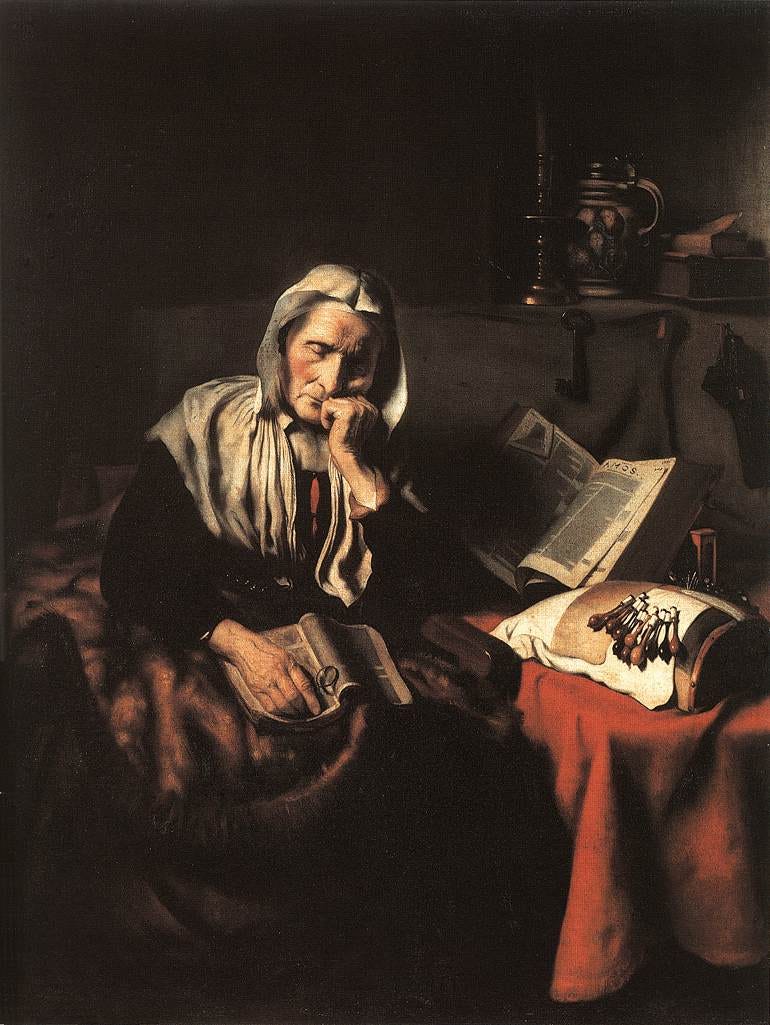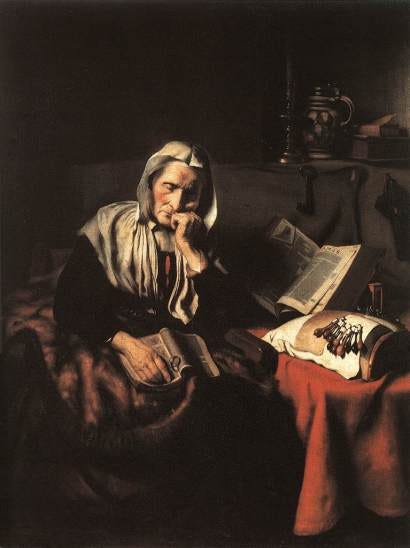How Jesus Wants Us to Pray


Old Woman Dozing, Nicholas Maes
Please note – I have amended this essay to fix a conflation of passages, a mistake I made in its original publicationa.
Jacob wrestles with Jesus at the gate of the house of God, and he hangs on unceasingly for he sake of goal of the prize of the blessing from his wrestling partner. Jacob vows and follows through: I will not let you go unless you bless me. And after Jacob wins, the defeated Jesus hands over the goods – the blessing Jacob sought. And yet, there is something Jesus would not give him. Jacob asked for his name, which Jesus had not given out yet. Jesus refused. And he also wounded Jacob with a simple touch. We know that Jesus let Jacob win. But within the limits Jesus set, Jacob did win after a long, hard battle.
Jesus tells us to pray this way, like a persistent Jacob – or in Jesus’ parables in Luke – as a persistent widow, and as friend willing to annoy his friend in the middle of the night. We are to knock, as the widow would at the judge’s door. Or we are to pursue our friend in the middle of the night, when he is most likely to relent for the sake of the annoyance. The widow’s great weapon for defeating that judge is, indeed, “persistence.” The friend’s effectiveness is in his annoyance! And all this with a wicked judge, and a bothered, groggy friend. God is not evil or tired, so even better for our labor of persistent annoyance. God is not wicked that he should ignore us, nor is he short fused or sleepy that we should annoy him. But he says the action of prayer will work closely enough to make these analogies our guide. Bother him like he is failing to give you justice, and use annoying repetitiveness as your weapon. He will condescend to be limited, and at some point we will fill up the measure he has set before him, and he will arise and get to work for our benefit.
Of course remember, he NEVER gives out what he doesn’t want to give out, or what we ask for before it is time to get it. So you can’t actually force God to do what you want. But he will let you badger him into doing what he already wants to do. He is just waiting for your voice to rise persistently. He wants a wrestler out of you.
He may also wound you in the process. He wounds to show what power he will use to bless you. He wounds you to remind you that you are not the source of the blessing that he will bring. He wounds to mark you with a persistent reminder of the good God who stooped to the willingness to play a game of uncle, and who let you get your knee between his shoulders before he said “you win.”
Jacob wasn’t stronger than Jesus. He was just more persistent than the limit Jesus set beforehand. He was doing what Jesus wanted him to do.
When man begs at the gate of the friend in the middle of the night, he is doing what Jesus wants him to do.
When the old woman persists in annoying the judge, she is begging and badgering for justice the way Jesus wants her to.
What Jesus will not give us is what he himself does not wish to give us. He will do what he wants to do.
Persistence, repetition, patience, and asking according to the will of God. This is what he wants us to do.
One last note – Common to Jacob and the story of the friend, the wrestling with God is at night. This is a natural time to pray, and many pray when they wake in the mid-night. Jesus’ disciples could not stay awake while he prayed mid-night. But this is also meaningful to our struggles. Struggles always feel like night time, and so we are reminded not to sleep through our troubles, but to see the trouble, the night time as a signal that the friend is in the right situation to be annoyed into action. Instead of thinking, God will do nothing – think, this is exactly when God wants me to bother him into acting. Into doing.
And after we persist, he will let himself be beaten into action, but he will arise to prove himself powerful (and often to prove us weak), and he will act in a way that his strength is displayed.
It isn’t magic we can wield, but it is a prescribed formula we can trust. It is not a formula we can time to know when we will flip the switch. And if we ask for what he does not want, he will say no. But we must learn that often we have not because we wrestle not.
—–
Luke Welch has a master’s degree from Covenant Seminary and preaches regularly in a conservative Anglican church in Maryland. He blogs about Bible structure at SUBTEXT. Follow him on Twitter: @lukeawelch<>статистика поисковых слов
Thanks to Nathan N., my faithful friend for pointing his Nathanic finger and saying “You are the man…who has mixed up two similar passages.” Accordingly, I repent. (back)
Thanks to Nathan N., my faithful friend for pointing his Nathanic finger and saying “You are the man…who has mixed up two similar passages.” Accordingly, I repent.
The post How Jesus Wants Us to Pray appeared first on Kuyperian Commentary.

